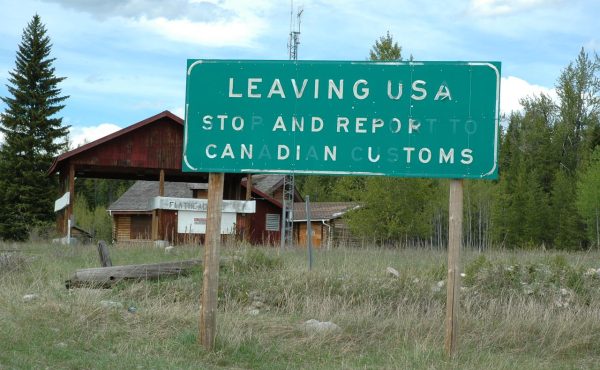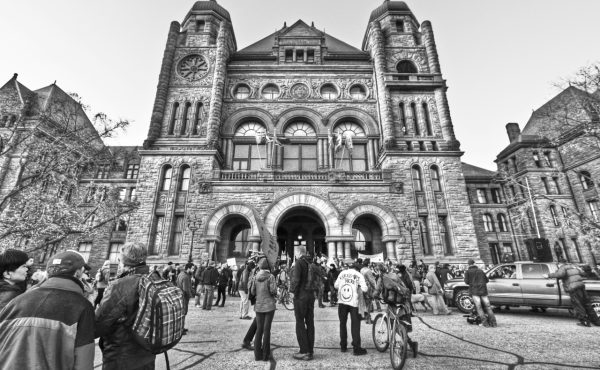

In case you didn’t notice it, that little puff of smoke receding over the horizon this fall is Metrolinx’s $50 billion Big Move investment strategy — a hugely ambitious but fatally mismanaged plan whose fate has been quietly sealed in recent weeks by the same government that brought it to life.
I haven’t seen anyone link natural gas plant-gate and Metrolinx’s scheme to bring forward a range of hefty tax measures capable of raising $2 billion a year for regional transit expansion. But if you connect the dots, it seems increasingly clear the Liberals’ chances of seeing this plan to fruition are virtually non-existent.
To re-cap: In a frenzy of the most craven sort of politicized decision-making, the Liberals in the last election vowed to move two gas plants in the western GTA to less controversial locales at a cost, as we learned last week, of $230 million, and counting. And all this green to save the hides of five Liberal MPPs. In pure dollar terms, it’s a scandal that should, in theory, overshadow, the $100 million sponsorship debacle that destroyed their federal brethren in the mid-2000s.
The latest revelations gave rise to a spasm of outrage and contrition at Queen’s Park – a contempt allegation against energy minister Chris Bentley, the suspension of parliamentary business, and a self-flagellating op-ed by premier Dalton McGuinty. Don’t be deceived by the fact that the controversy abated: my guess is that Andrea Horvath and Tim Hudak are both keeping their powder dry in anticipation of a spring non-confidence vote on the next Liberal budget.
Ah yes, the spring budget. Given that the Liberals – riding high at 20%, according to a new Forum poll — have kept themselves busy of late pissing off vast segments of the civil service (read: voting public), and that this gas plant business renders ridiculous their Tory-inflected budget restraint efforts, I think it’s safe to predict the McGuinty era will grind to a halt sometime next spring.
The Metrolinx investment strategy is due out in June, 2013.
Do the math.
More urban seats will fall to the NDP while the Tories will soak up centre-right voters who want change, even if they aren’t in love with the smooth-cheeked son of Niagara. And don’t expect the Liberals to run on a platform pledging to impose transit taxes on the GTA, although they’ll surely be accused of the same.
My prediction: a Tory minority by next fall.
Perhaps the fact that the Liberals appear to be disintegrating explains why Metrolinx — conveniently embroiled in a highly distracting feud with the Toronto Transit Commission over the LRT outsourcing scheme — has grown conspicuously silent about the elusive investment strategy.
City officials yesterday released a once-over-lightly report outlining the tax ‘n toll measures required to raise $2 billion a year across the GTA and Hamilton. That document lands next week at executive committee. If it survives the yodeling and inanity from the mayor and his dwindling collection of allies, said report will go on to council, which will earnestly establish a public consultation process.
All good, but the big money measures require complex provincial legislation, which means the ball is still in the province’s court. And there’s no evidence that Metrolinx — which is said to be analyzing the viability of the various tax tools – wants to seed the clouds for a big discussion about the investment strategy.
And why should the agency bother? CEO Bruce McCuaig and chair Rob Prichard surely understand the fluid political context as well, if not better, than anyone else. Indeed, Prichard himself will remember what happened in 1996, when the NDP-appointed Anne Golden taskforce on the future of the GTA (of which he was a member) delivered its sweeping vision to the incoming Mike Harris government.
Thanks, Tory municipal affairs minister Al Leach told Golden, but no thanks.
As today’s political scenery shifts, the existential problem facing Metrolinx is that the Liberals failed to fortify their agency against…shifting political scenery. The board is comprised of Liberal appointees, with no independent source of political authority or legitimacy. The Big Move strategy itself is something of an artifact, the product of a brokered negotiation among a set of political actors at a particular moment, now long passed. And with the passage of time, it seems clear the agency is little more than an operating division of the ministry of transportation.
A veteran civil servant like Bruce McCuaig knows better than to hand a new government a costly strategy decked out with all manner of political trip wires.
In fact, even if the Liberals try to run on a platform that includes a pledge to bring in a bevy of new regional taxes to pay for this thing — which seems unlikely, given their other money management problems – a general election will render this maddeningly slow policy vetting process even slower.
So while transit advocates continue to debate the relative policy merits of regional sales taxes versus parking levies versus road tolls, the political reality is that the Metrolinx Big Move investment strategy appears to be a dead man walking.
For those who plan to participate in the transit funding consultations later this year and early next, the state of provincial politics leads to just one conclusion: if Toronto wants to expand transit, we’re going to have to pay for it ourselves.




9 comments
The province’s booting politicians off the Metrolinx board is coming back to hurt them in so many different ways. How can Metrolinx develop any buy in for its plans without involving the city and region governments from the get go? That’s why having some local pols was always a good idea. It is sad to think that attempts at regional planning for transit and transportation are going down the drain once again due to election cycles of Queen’s Park & City of Toronto.
Recent revelations of the sweetheart deals for operation of private sector power plants — we will pay you whether we need your power or not — throw the entire private sector scheme for Metrolinx project construction into a very different light.
Also, I am waiting for the Presto project to turn into a full-scale debacle as the amount of money needed to build a roll-your-own fare collection system emerges into the light of day. Ontario has a sad history of trying to build its own transit technologies.
The removal of politicians from the Metrolinx board marked the point at which any possibility of relevance separate from McGuinty’s policies-of-the-moment ended.
Sadly, a Tory minority would demolish Metrolinx but much more needed work on transit would stop as well.
John, it is especially sad to read your post in conjunction with Dylan’s. All I can hope is that when Hudak comes in he does not fill Eglinton back in. Heck, why should I care. I have got subway at my door step (which I rarely use anyway). All that really matters to me is bike lanes, but I am comfortable navigating downtown streets on my bike already. From that perspective, keep the status quo is probably the best for my property value.
This is very encouraging news. We currently have a flailing, incompetent Liberal government barely clinging to power and on the verge of jettisoning whatever is left of its transit strategy. And who’s most likely to replace them? The Hudak Conservatives with their “whatever Robbie said” transit strategy – which, as we all know, is nothing more than empty platitudes and scribbles on a napkin.
Looks like it’s back to the drawing board – with another decade or two down the tubes. Hey, who’s counting anymore?
Those occasional suggestions that Toronto become a separate province make more sense by the year.
the scary thing is that no one is paying attention to the massive need (demand) for increased service capacity on the existing TTC subway network, which is crumbling… when the core system (Bloor line/Yonge-University line) goes out, there will be nothing in its place.
AT will be the only way. Active transportation (walking, biking) and carpooling/driving will be people’s only options. Active transportation will be the only way people can get around, because 60,000 riders/peak hour use the Yonge line and there is not enough car capacity to carry that volume. Without any transit redundancy (no back up, no detours, no alternate line), biking and walking will be necessary evils!
it frustrates me greatly that redundancy is provided for highway and road infrastructure, so there are multiple east-west roads and highways, but there is only one east-west subway line, and if it’s down, we’re all screwed in the GTA (whether you’re coming from Mississauga, Scarborough, or Durham)
likewise for the Lakeshore GO line, there are no other options east-west. That would never happen for roads/highways. There is a whole web of options for travellers to use/transfer/take a detour only several minutes away by driving.
However, conventional transit planners and mindless politicians keep “expanding” transit by stringing it out to places like Bowmanville without thinking about what people really need, which is reliable, frequent transit (from Oshawa to the western parts of GTA) without unpredictable waits/interruptions or an inability to divert if there was an emergency… This dynamic transit grid could be achieved if expansion was prioritized – not ‘outwards’ to areas that require huge subsidies (have low ridership) – but expanding the number of transit choices on the EXISTING lines that already have excess demand that is not met. The benefits would be enormous – the GTA would actually get a dynamic transit network and the fare collection would cover a great portion of the capital and operating.
The naysayers would say that new developments need transit lines strung out to far flung places and need to be subsidized for years in order to cultivate ridership, and this is a complete lie, and it doesn’t work. It’s a nice to have, if you’ve got a tonne of money to burn, but we don’t in Ontario. New developments that don’t have high ridership off the bat don’t evolve into walkable, high 70% fare recovery ratio places… they always have to be subsidized and end up making 20% or 30% or maybe high 30% fare recovery if you’re lucky. No wonder rural Ontario hates Toronto, but it’s not Toronto to blame for this crap – it’s the Provincial and 905 politicians who squander everyone’s hard earned tax money.
i’m so demoralized about transit… like a lot of people who live/work in central parts of Toronto, I am choosing active transportation because streetcars are jammed (inside with people crushed together and outside crushed with cars weaving among parked cars and other cars and budding in front of streetcars) and I don’t bother using the subway system because it’s crammed with 905ers.
active transportation will really be people’s only choice when the TTC system crumbles and falls apart, which would be inevitable especially with agencies that are regional who will gang up on Toronto, and keep stringing the system outwards and farther because they want people on their own 905 rapid transit systems, which is so short sighted because most 905ers drive to take TTC’s subway system. TTC’s subway system is mostly for 905.
The 905 municipalities would be better off actually creating express bus networks, as opposed to only a couple measly lines that are super-expensive and don’t carry much more than they could have with less expensive marketing/padding, when 905 constituents are left pretty much without any kind of transit system at all, except for the ultra-subsidized high-end long buses that are Zum or VIVA – a gigantic rip-off… These stupendously stupid decisions are partly bankrupting the Province and killing transit prospects in Southern Ontario by making transit a black hole that is dysfunctional and requires subsidies that are not possible given the rest of the mismanagement of the provincial budget.
My rant is becoming nonsensical in my frustration and rage. Glad I can just go outside and walk. Transit is a dean man walking.
Some good posts here. I am not sure the NDP wont form a minority government as many are leery of Hudak.
Kicking politicians off the Metrolinx Board was a fatal error that could mean the Liberals have created another 2 decades of transit stall.
But why would anyone tolerate a Tory minority?
An NDP-Liberal coalition would be more reasonable.
Metrolinx had better hope it’s not Hudak. He’s made no secret it’s curtains for the Liberals’ favourite pet if he’s installed in the Premier’s office. I can’t imagine the NDP being too friendly either, although (in my opinion) they would prefer to clean house to the Tory chainsaw approach.